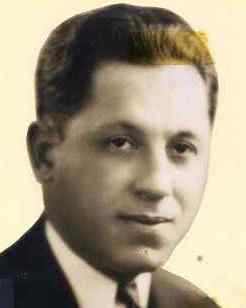
Robert Ellis Katz
SelectRelation to Sam Seymour Margolin ResetThe selected persons are not blood related.Robert Ellis Katz, the father of
Ellis Robert Katz, the father of Private, the spouse of Private, the child of
Margie Sylvia Evensky Goodman, the daughter of
Bessie Rose (Rochel) Margolin Evensky, the sister of
Sam Seymour Margolin
- Parents: Elias Katz and Ella Polishook Katz
- Siblings: Jack Katz Irving Katz Fannie Katz Baum
- Spouses: Ethel Miller Katz
- Children: Ellis Robert Katz and Florence Harriet Katz Liberman
- Gender: male
- Birthplace: Berdychiv, Zhytomyr, Ukraine
- Deathplace: Los Angeles, California
- Immigration date: 1891
- Occupation: Salesman
- Occupation: Entrepreneur
- Occupation: Soldier - World War I
- Wedding date: 1917-06-03
Biography by Ellis Katz:
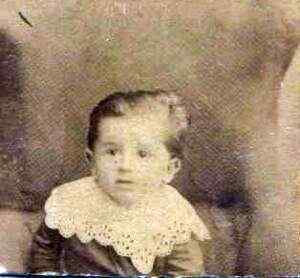
Baby Robert
Dad was born in Berdichev, Ukraine Aug 25, 1888. As a 2-year old, he came with his mother, father, two brothers and a sister to Chicago. In later years he would say how he could still recall the smell of the third-class quarters of the ship that brought him to these shores. His father's name was "Elias" (for whom I was named); unfortunately, he died before I knew him. I do not recall my grandmother's name but I knew her as a dear kind lady. Dad was the eldest of his siblings; his brothers were Jack and Irving and his sister was Fanny.
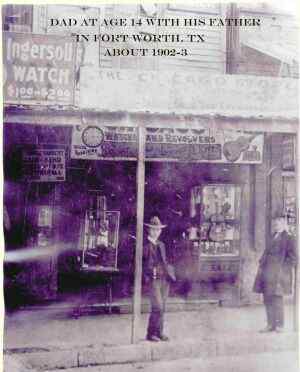
In front of store
Dad, as a young dude in his early twenties, enjoyed and was very good at dancing and roller skating. But, most of all, he had a great gift for sales. He had left home at the age of eighteen and talked his way into his first job as a glove salesman for a Tulsa department store. Later, he moved to Toronto as sales manager for a leather goods company. After Canada entered WW I in 1914, Dad found himself uncomfortable as a U.S. citizen in Canada and asked for a transfer to the U.S. That move was fortuitous because it was while traveling on business to Chattanooga that he met his beautiful Ethel.
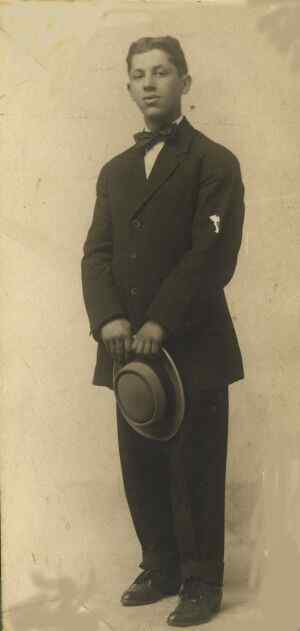
The dude
On his first trip to Chattanooga, Dad was introduced to Ethel Miller, then age seventeen. He "swept her off her feet". Her local beaux were upset that this "Yankee" dude (wearing spats, yet) had come to their town and was squiring their local beauty. Dad soon found reason to anchor his sales travels around Chattanooga and, in the spring of 1917 they were engaged and, on 3 June they were married.
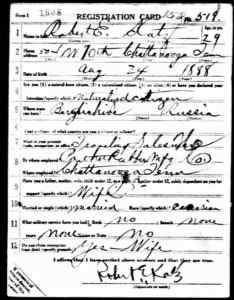
Robert's military registration card
In the summer of 1917, Dad registered for the draft [click on photo for enlargement], trained and shipped to France with a Tennessee division. My Mom had tried everything to keep her husband safe at home...even appealing in person to the governor for his release. Nevertheless, Dad served with distinction as sergeant in an artillery company until the armistice, Nov 11, 1918.
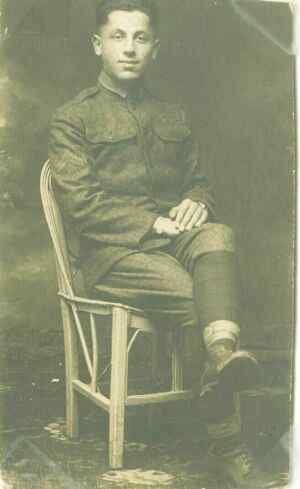
Robert as a soldier
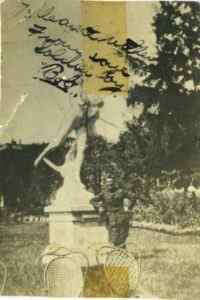
Robert in france
With the war over, Dad returned home to his bride and set about making a living. He traveled for the Panther Leather & Rubber Company selling rubber heels and leather goods to shoe makers and associated businesses.. In later years, at an annual conference of the industry, he was noted as one of the pioneers in the business. However, due to an import/export fracas with England in the early twenties, the business dried up and, with a young family to support, he took on many different "lines". It didn't really matter, Dad was a super salesman and always provided for his family
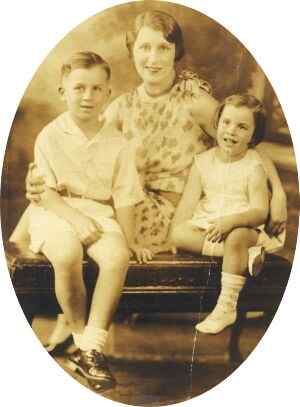
Ethel Katz with her two children, Ellis and Florence
By 1926, Dad's family included my sister, Florence, and me. Dad was doing well and his family was then living in Providence, RI.
The family had already lived for short periods in Chattanooga, Miami and Chicago (Dad's travels took him far and wide). In those heady days of the mid-to-late twenties, we lived in comfortable circumstances and my parents enjoyed a very active social life.
But, as the depression set in by the early thirties, businesses failed, and Dad had to take on more "lines" and be longer away from home...times were tough. So, in 1932, Dad moved the family to Atlanta where, with a "shoe-string and some spit", he opened a ladies ready-to-wear store. But ladies couldn't afford new dresses so Dad went back on the road. He sold popcorn machines, chemicals, ladies dresses, "dress-protectors" (his invention) and anything else he could fit into his travel-weary old Plymouth. During the summers of '35 and '36, I traveled with my father through the small dusty towns of Mississippi, Alabama, Georgia, and South Carolina. There would usually be a general merchandise store on the town square and Dad was always greeted with a big welcome from the owner: "Hello Bob, happy to see you...but you know I can't buy anything". And Dad would smile and reply, "I wouldn't sell you anything if you wanted it". But...Dad would sell him anyway. And, then, after the day's business, we would check into a "drummers" hotel where the traveling men would sit around the lobby telling their stories...and all welcomed Bob Katz. My father was a great story teller and his stories were part of his secret of sales greatness.
In 1937 the family moved to Jacksonville, FL to be nearer Dad's base of travel but, when the war began in '41, the family returned to Atlanta where Dad joined my uncle, Ben Cohen, in a thriving concession business in the Terminal Rail Station.
Within a few short years, Florence and I had married and moved away...my sister to Seattle and I to Hampton, Virginia. And, with their family secure, our parents moved to Miami Beach where Dad founded a successful chemical supply business. He was prouder of that than anything he had done in business.
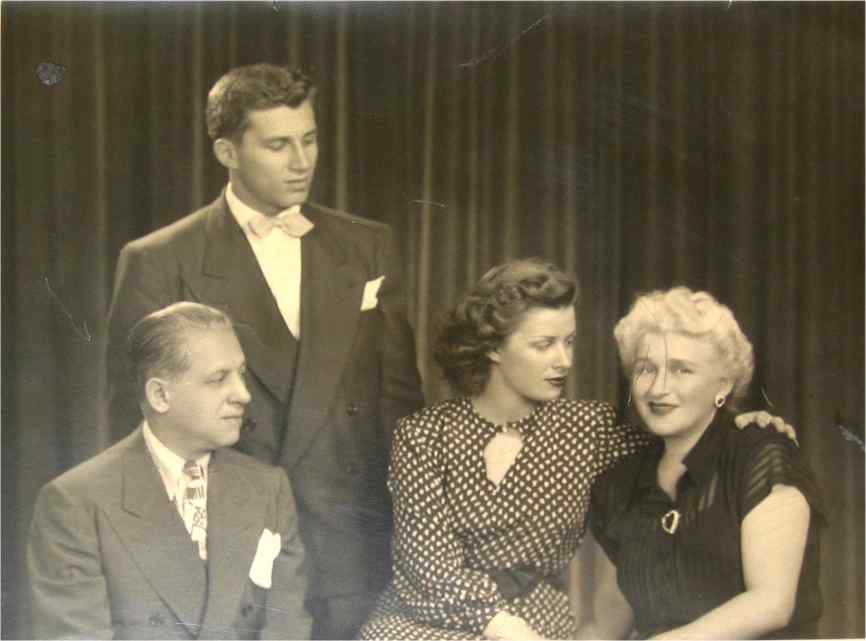
family pic
By '51, Dad and Mom moved to the west coast to be nearer Florence. Dad managed a dress store and, later, sold real estate. When the dress store failed, it was just like my father to pick himself up and start anew by going to school and getting his real estate license.
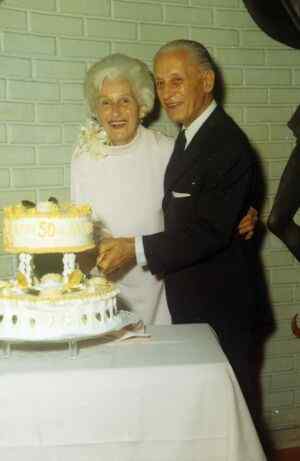
My father had an unquenchable love of life. He was the finest man I have known. He met challenges I could never have met. Although not a big success in material matters, he was highly successful in all that truly counts. My father was respected by all who knew him; loved dearly by his wife of 60 years; loved and admired by his children and grandchildren.
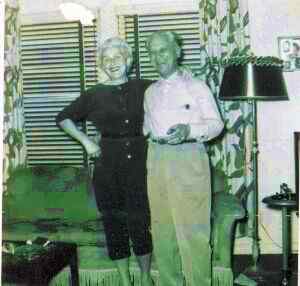
retired
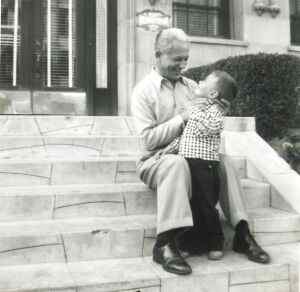
with alan
Here is Dad with his first-born grandchild, Florence’s son, Alan. He was very proud of his four grandsons: Alan, Ron, Dan and Paul.
The Steak Dinner
It was the spring of '36 in Atlanta, Georgia and the deep depression was on. Dad had just lost his two stores to bankruptcy and was struggling. The only other thing he knew was on-the-road sales so he took his last dollars to New York to find “lines” that he could “drum” on the road.
Returning to Atlanta, he had secured two “lines” of ladies clothes to sell on the road. He had his territories: Georgia, Tennessee, South Carolina ...and had installed a rod across the back of his '31 Chevy to hold his heavy display bags.
He'd been traveling for several months when, in mid-July, he asked me to travel with him; I was to carry his heavy display bags in and out of customer stores. I was fifteen, big & strong, but not happy to give up my summer sports for something so dull. You've got to understand that I was a very spoiled brat...my Mom had made me so.
I tried all kind of stories, but Dad prevailed...it was a matter of making a living. So, off we went...no air conditioning, no radio, no nothing but hot dusty little southern towns.
Each town had a central square with a courthouse in the middle...often graced by the statue of a Confederate general. Around the square were stores and shops and, inevitably, a “dry-goods” store and, perhaps, a ladies store.
As we would stop at these places the owner would greet Dad, “Hi, Bob, glad to see you but I'm not buying anything just now “. Dad would grin and reply, “That's okay, I wouldn't sell you anything if you wanted it”. And then, Dad, would ask about the family, crack a few jokes and sell a few orders to the reluctant proprietor...no question about it...Dad was good!
After making two or three “towns”, we would stop at a “drummer's” hotel. This was usually a run-down “2-bucks a night” place near the central square. Then came the part I hated. Dad would check in as a single, go to his room, and wait while I found a way to get there without being noticed by the hotel clerk. I really hated it! I hated all that kind of stuff...like paying at the movie house as an 11-year old when I had just passed my 12th birthday.
Later we would go out for a cheap meal (10 cent hamburgers and 5 cent cokes). We would return to the “hotel” where, in the lobby, were gathered all the “drummers” telling their stories, jokes and lies about the day's events. They all knew Bob, the greatest storyteller of them all. We would sit around on beat-up sofas and chairs in an atmosphere of liquor and smoke, a moth-eaten and ash-burned oriental rug in the center. I was enchanted and very proud of Dad.
But, then came the big day...the day this story is about. Dad made three big sales before we turned in. That evening, as we walked out of the “hotel”, Dad asked the bellboy, “Where can you get a good piece of meat in this town?” The bellboy replied, “Oh, you want Charlie's Steak House. It's near here, two blocks to the left, and one block to the right. You can't miss it”.
Dad and I just grinned at one another. Tonight we were going to eat “high on the hog” at Charlie's Steak House.
As we entered Charlie's, the juices started flowing at the smell of charcoal broiling steaks. We sat at a horseshoe bar in the last two empty seats. Dad said, “Bring us the biggest you've got”.
When the two big sizzling steaks were served, we laughed and laughed and we ate and ate. It was, no question, the most delicious steak we'd ever had or ever would have. It was a special moment; a time that Dad and I would always remember and we would laugh and laugh again. There would be other good days, other towns, and other steak joints but there would never be another moment like that.
Years later, I went for a job interview to a small southern town. I checked into a rather seedy hotel (I was on my own expenses) and went that afternoon for what turned out to be an unacceptable job offer. That evening, as I walked out of the lobby, I had an epiphany: I felt certain that, if I walked two blocks to the left and one block to the right, I would find Charlie's Steak House and have myself a fantastic steak to make up for my interview losses.
Well, Thomas Wolfe said it all: “You can't go home again”. The steak was lousy, overdone and overpriced. And that's all there is to the story of a great steak dinner.
Extra information may be sent or requested by emailing the site administrator.